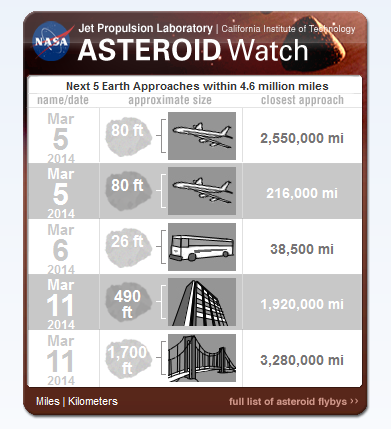Findings published on March 4th by the aeronautics and space administration, NASA, reveal that a drifting asteroid swang by Earth at a perilous proximity of approximately 217,000 miles (350,000 kilometers) on March 5th at 1 pm PST. Unexcitingly named 2014 DX110, the asteroid measures an estimated 100 feet (30 meters) in diameter.

DX110
A fact worth noting is that the average distance between the Earth and moon is 239,000 miles (385,000), so the asteroid is much closer to the moon’s orbit than that of the Earth’s gravitational force. Given its mass and propulsive force, there’s no risk of the space rock being pulled down on someone’s doorstep. Moreover, NASA claims similar encounters are recorded as often as 20 times a year according to current detection capabilities. Maybe these “current detection capabilities” are in need of an upgrade if they’ve only observed 2014 DX110 a few days prior. At least that’s what the date of the press release would have us think, given its publication date being so close to the actual event.
Detection tactics
Bearing a much more determined name than DX110, the program NASA has in place for spotting asteroids and comets, “Spaceguard,”uses a combination of ground-and space-based telescopes. The program acts preemptively, categorizing each object to identify if it poses a hazard to our planet.

Asteroid watch widget
If you happen to be an enthusiast of potentially apocalyptic asteroids, NASA provides a widget for tracking the size and the closeness of approach, displaying each object’s name once a user hovers a mouse over the encounter date. Clicking on said date will launch additional information; all data displayed on the widget accounts for the next five approaches within a distance of 4.6 million miles (7.5 million kilometers).
Via NASA
Advertisement
Learn more about Electronic Products Magazine





